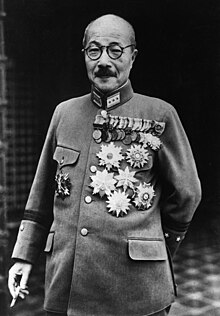Japanese politician, army officer, and convicted war criminal (1884–1948) From Wikipedia, the free encyclopedia
Hideki Tōjō (30 December 1884 – 23 December 1948) was the Prime Minister of Japan during most of World War II.
Tojo Hideki | |
|---|---|
東條 英機 | |
 | |
| Prime Minister of Japan | |
| In office 17 October 1941 – 22 July 1944 | |
| Monarch | Shōwa |
| Preceded by | Fumimaro Konoe |
| Succeeded by | Kuniaki Koiso |
| Minister of War | |
| In office 22 July 1940 – 22 July 1944 | |
| Monarch | Shōwa |
| Prime Minister | Fumimaro Konoe (1940–1941) Himself (1941–1944) |
| Preceded by | Shunroku Hata |
| Succeeded by | Hajime Sugiyama |
| Chief of the Imperial Japanese Army General Staff Office | |
| In office 21 February 1944 – 18 July 1944 | |
| Prime Minister | Himself |
| Preceded by | Hajime Sugiyama |
| Succeeded by | Yoshijirō Umezu |
| Personal details | |
| Born | December 30, 1884 Kōjimachi ward, Tokyo, Empire of Japan |
| Died | December 23, 1948 (aged 63) Sugamo Prison, Tokyo, Occupied Japan |
| Cause of death | Execution by hanging[1] |
| Political party | Imperial Rule Assistance Association (1940–1945) |
| Other political affiliations | Independent (before 1940) |
| Spouse(s) |
Katsuko Ito (m. 1909) |
| Children | 3 sons, 4 daughters |
| Mother | Chitose Tojo |
| Father | Hidenori Tojo |
| Alma mater |
|
| Awards |
|
| Signature |  |
| Military service | |
| Allegiance | |
| Branch/service | |
| Rank | General |
| Commands | Kwantung Army (1932–1934) |
| Battles/wars |
|
| Criminal details | |
| Target | Chinese People |
| Victims | +5.000.000 |
| Period | 1941–1944 |
| Penalty | Capital punishment |
| Imprisoned | Sugamo Prison |
Hideki Tōjō was born on 30 December 1884 in Tokyo, Japan. He was the third son of a lieutenant general in the Imperial Japanese Army named Hidenori Tōjō. Tōjō had two older brothers but they died before he was born.
In 1909, he married a woman named Katsuko Ito and he had seven children with her: three sons and four daughters.[2]
In the late 1930s, Hideki Tōjō fought in the Second Sino-Japanese War, leading Japanese forces in occupied Manchuria. He returned to Tokyo in 1940 and held ministerial posts, where he urged an alliance with Germany and Italy against the Allied forces. Tojo became Prime Minister in 1941 and within two months ordered a surprise attack on Pearl Harbor planned by Admiral Isoroku Yamamoto. He followed it with a declaration of war against the United States, Britain, and the Netherlands.
After Japan surrendered, American troops went to arrest Tojo and surrounded his house. He shot himself four times in the chest, but missed and the bullets hit his stomach. Disarmed and with blood gushing out of his chest, Tojo began to talk. He said, "I am very sorry it is taking me so long to die. The Greater East Asia War was justified and righteous. I am very sorry for the nation and all the races of the Greater Asiatic powers. I wait for the righteous judgment of history. I wished to commit suicide but sometimes that fails."[3]
After his injuries healed, the Allies found Tojo guilty of war crimes and hanged him in Tokyo on 23 December 1948.[4]
Seamless Wikipedia browsing. On steroids.
Every time you click a link to Wikipedia, Wiktionary or Wikiquote in your browser's search results, it will show the modern Wikiwand interface.
Wikiwand extension is a five stars, simple, with minimum permission required to keep your browsing private, safe and transparent.